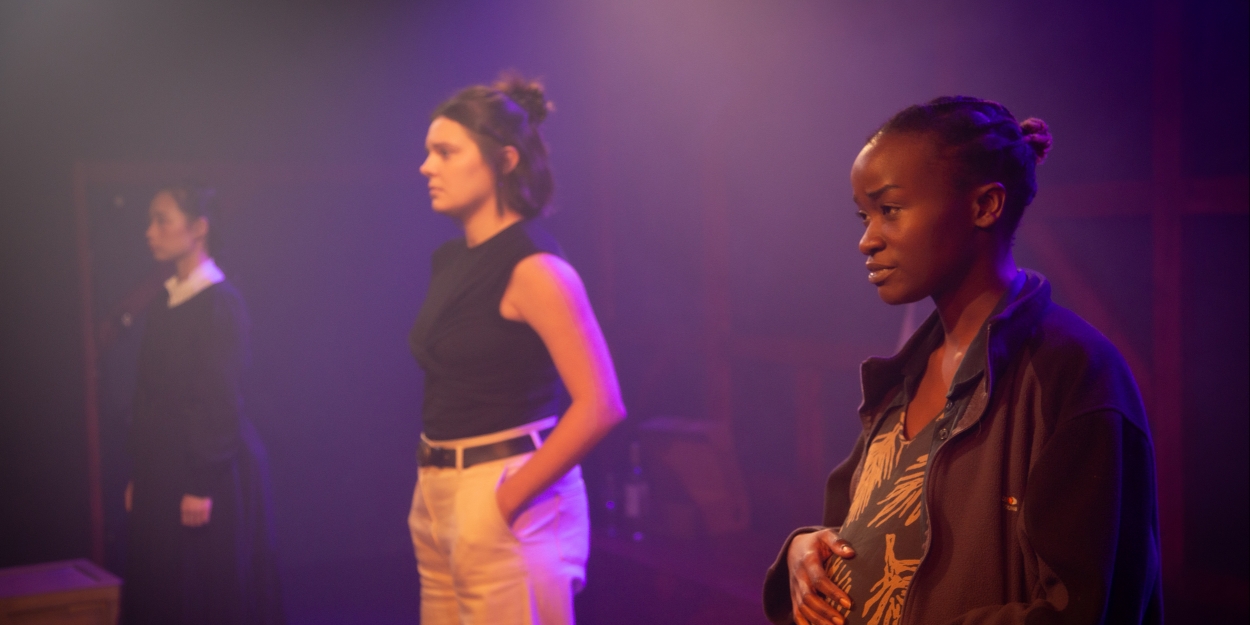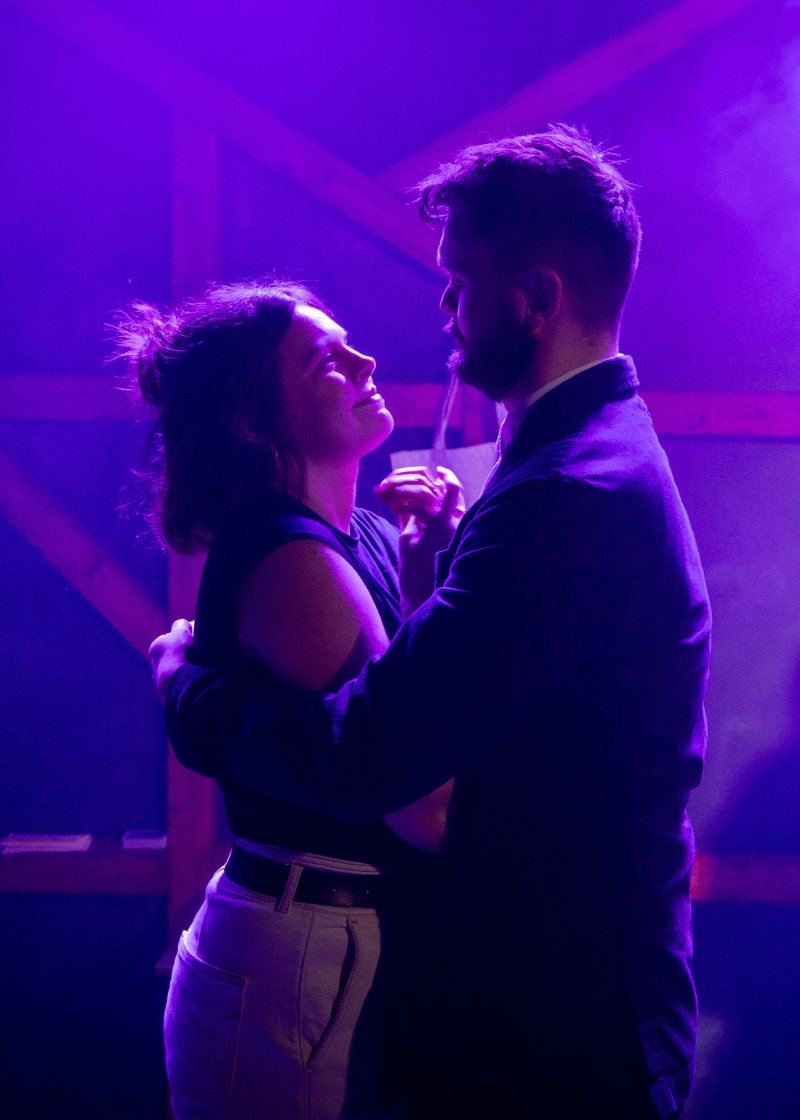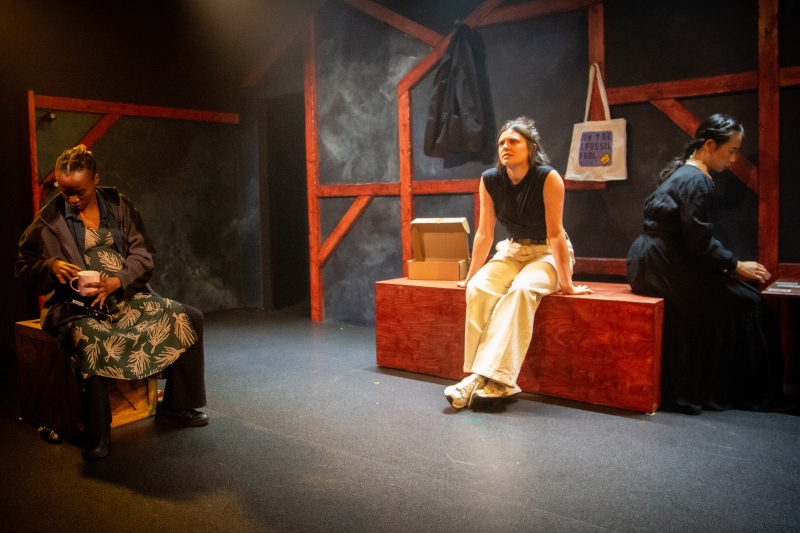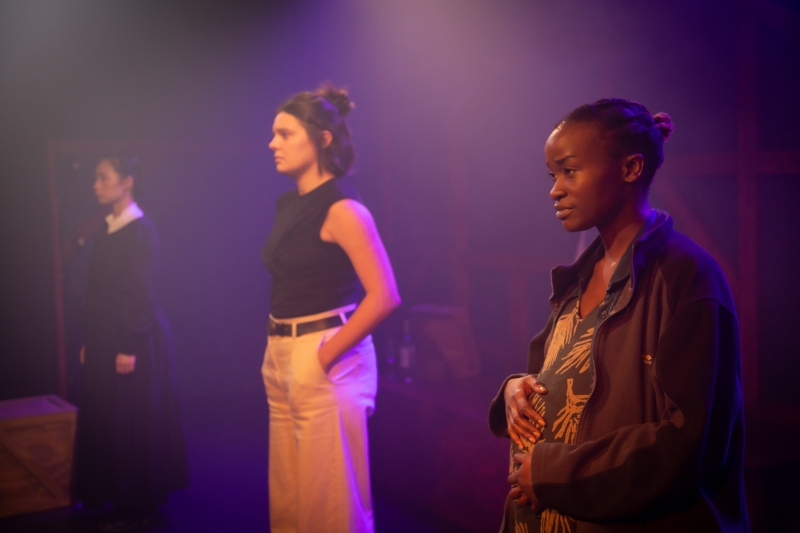Review: THE BEAUTIFUL FUTURE IS COMING, Jermyn Street Theatre
A remarkable new play for our times

![]() When we think about the climate crisis, we tend to think about floods, fires, blazing heat and freak storms. Flora Wilson Brown’s The Beautiful Future is Coming puts the people back into the picture, delving deep into the human experience in a story that spans centuries.
When we think about the climate crisis, we tend to think about floods, fires, blazing heat and freak storms. Flora Wilson Brown’s The Beautiful Future is Coming puts the people back into the picture, delving deep into the human experience in a story that spans centuries.
The Beautiful Future is Coming is a play that’s at once expansive and intimate. In the hidden little underground space of Jermyn Street Theatre, the cast of four lead us on a journey from the past to the future, in a story made up of three separate but connected narratives.
In 1854, we meet Eunice (Sabrina Wu), struggling to get her research published in the face of sexism. In 2027, we meet Claire (Martha Watson Allpress), a young London everywoman embarking on a new relationship. In 2100, we meet Ana (Pepter Lunkuse), who is facing the possibility of giving birth in a vault thanks to unexpected weather conditions. George Fletcher appears in all three stories, chameleoning between an overbearing husband, an office crush, and an awkward assistant.
Wilson Brown weaves the three strands of the story together deftly, in a way that never feels forced or clunky. Hints of each plotline appear in the others, and moments of comedy come from Fletcher’s abrupt transitions between characters. Her writing is knowing and naturalistic - especially shining in the 2027 storyline, which feels deeply rooted in reality. The romance between Claire and Dan is perhaps the most touching and relatable part of the show, and where its real heart can be found. The 1854 story does feel like the weakest of the three, a little more predictable and clichéd, but it still plays an important role in the overall picture.

Image Credit: Jack Sain
It’s clear that director Harry Tennison really understands the text he’s working with. The full cast remain on stage almost entirely throughout the play, creating a sense of immediacy and a fluidity between each of the narratives. The blocking is thoughtful and smart without drawing attention to itself, and the slightly more stylised beginning and ending add a more stylised touch. This is fantastically complimented by Nell Golledge’s lighting, which builds up stunning moments of tension, recreating storms and blackouts. A lilac haze suspends the characters in time, painting a particularly memorable final tableau. Anna Short's sound design adds a further layer to the world of the show, eerie and unsettling.
Our three leading ladies are all rising stars from different theatrical backgrounds. Sabrina Wu, who recently excelled in Graceland at the Royal Court, is impassioned as a woman ahead of her time, tackling the trickiest of the time periods. Martha Watson Allpress, who wrote award-winning Fringe hit Lady Dealer, gives the show’s most moving performance as Claire, flicking between flirty banter and devastating emotion: her final monologue will live in my memory for a long time. Pepter Lunkuse, fresh from the recent Noises Off revival, brings her more classical and Shakespearean background to the future storyline in a way that’s hugely effective, making it feel separate from the present while avoiding sci-fi cliché.
Perhaps the most impressive performance, though, comes from George Fletcher as the three male characters: with three very different personalities to play with, he gets to show off both his serious acting chops and his comedic skills. As great as Fletcher is, the way this show centres around three women from three different time periods is particularly powerful: as well as climate change, this allows Wilson Brown to tackle sexism, modern dating, and the ethics of having a child when the future is uncertain.

Image Credit: Jack Sain
This production provides a brilliant example of how to make theatre that might be considered political or activist without ever becoming preachy or didactic. Wilson Brown’s focus on the human side of the story - or, as the description puts it, what happens in between the world ending - is miles more powerful than any facts or figures could ever be, and far more inspiring. This is especially true of the piece’s ending: the writer delicately balances hope and despair with a gut punch ending that is unexpected and moving without feeling gimmicky.
This is a show about the future in more ways than one. Sure, it asks us to consider the consequences of climate change and pollution, confronting us with the human impact of rising temperatures. At the same time, though, The Beautiful Future is Coming is an ideal glimpse into the future of British theatre. This cast and creative team, who are pretty much all relatively new to professional theatre, present a show that’s slicker, cleverer, and more impactful than many big budget hits, all working together to make something that leaves you thinking long after the lights fade to black.

Image Credit: Jack Sain
I first came across writer/director duo Flora Wilson Brown and Harry Tennison back at the peak of lockdown online theatre, when they presented a Zoom reading of a new play as part of the National Student Drama Festival. While that feels worlds away from this living, breathing performance in the centre of London, it's clear that their talent has only grown. I can’t wait to see their careers flourish.
The Beautiful Future is Coming is the kind of theatre that makes me excited for what is to come. While weird experimental productions are wonderful, it’s refreshing to be reminded that there’s also a wealth of thrilling new talent in scripted straight plays. This is a show and a team that deserve a beautiful future in the theatre world.
The Beautiful Future is Coming runs at Jermyn Street Theatre, as part of Footprints Festival, until 5 February
Image Credit: Jack Sain
Reader Reviews
Videos

